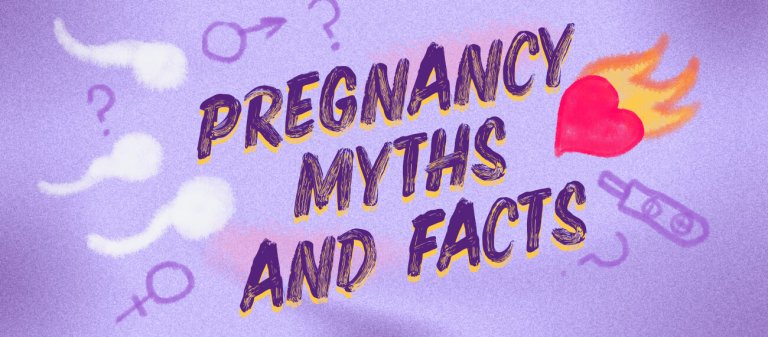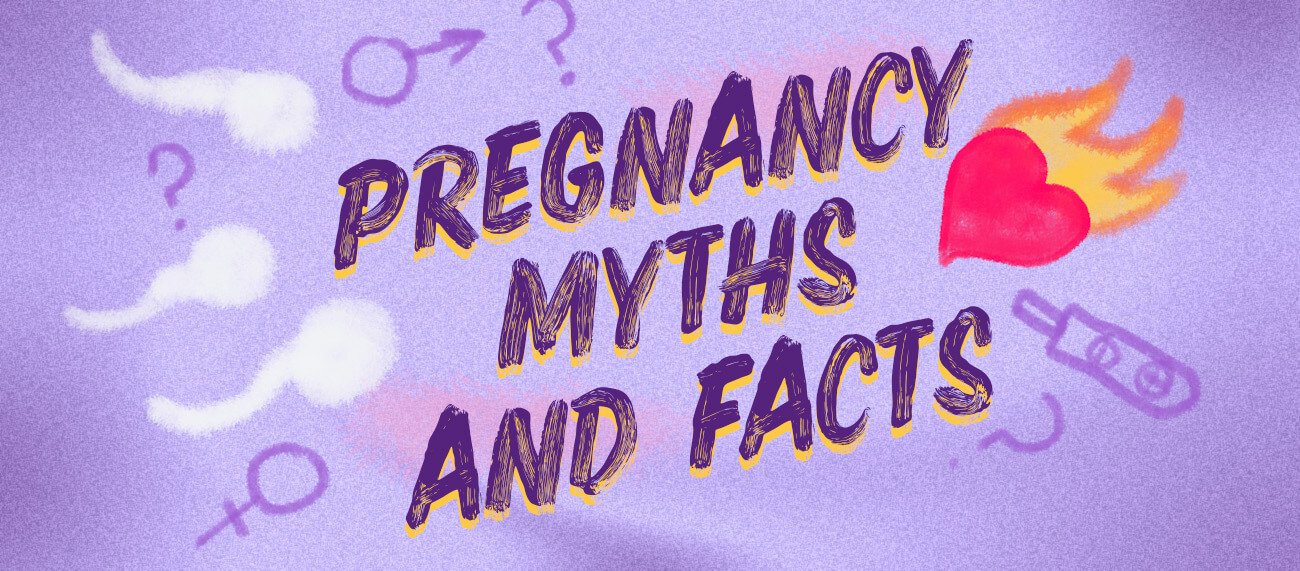Pregnancy Myths and Facts
If you’ve ever tried looking into how pregnancy works, you’re aware that there are SO MANY misconceptions about pregnancy and contraception being flung about haphazardly. Sadly, shockingly inaccurate myths are spread with no regard for pregnant people who end up believing that if you just eat enough apples, for example, your baby will be born a boy.
There are some major myths and facts about pregnancy prevention that are worth knowing too! Like, can you actually get pregnant from sitting in a hot tub with semen in the water? I really hope not, but let’s find out…
MYTH: Morning sickness only happens in the morning.
FACT: Morning sickness is called morning sickness purely because it’s more likely to happen in the morning, not because it only happens in the morning.
It’s one of the most well-known pregnancy symptoms: nausea and vomiting that can happen any time of the day. It’s most likely to be caused by pregnancy hormones which are rising fast in the early days of pregnancy, which is why it’s also likely to be at its worst during the first trimester. But just as it can happen during any time of the day…it can also strike at any time during the pregnancy.
Severe sickness – involving vomiting several times a day and being unable to keep anything you eat or drink down – may be due to a condition called hyperemesis gravidarum. Severe sickness affects 1 to 3 in every 100 pregnancies. If this is something you’re experiencing or concerned about, it’s worth discussing it with your GP.
MYTH: Heartburn in early pregnancy means you’re having a girl.
FACT: Is heartburn in early pregnancy a sign of a girl? Nope! It’s not true.
You can’t tell what sex your baby is by your symptoms, what foods you’re craving, or if you’re looking a bit worse for wear. To find out, you can take a blood test, wait and see if it can be determined during an ultrasound, or wait until the baby arrives.
There are a lot of old wives’ tales out there about the ways you can work out the sex of your baby! For instance, some believe that if you’re feeling especially ill, maybe you’re having a boy because their male hormones are conflicting with your female hormones. If you’re lacking that “pregnancy glow” you may hear that this means you’re having a girl because she’s “stealing your beauty” (which also kind of sounds like a roundabout way of insulting someone while also pretending that you’re helping them).
Heartburn has been linked to hairy babies, and this is thought to be due to the presence of hormones that encourage foetal hair growth and also relax the lower oesophagus, allowing acid to rise and cause that burning sensation. This does not always mean you will have a hairy baby, however! Often it just means you have heartburn!
MYTH: You cannot get pregnant on your period
FACT: It may not be the likeliest time of your cycle, but yes, you can get pregnant if you have unprotected sex during your period.
Ovulation occurs around the middle of your cycle, so about 2 weeks after your period starts. Sperm can survive in the body for up to 5 days after unprotected sex, and if you ovulate early or have a short cycle, sperm could still be present in your body when it happens.
During your period it’s unlikely that you will be able to predict that you are going to ovulate early even if you are tracking your body temperature, as a higher temperature usually indicates that ovulation has already taken place. If you are trying to avoid pregnancy, you should always use a form of contraception during sex as unprotected sex always carries a risk of pregnancy.
MYTH: You cannot get pregnant from precum.
FACT: There is often sperm present in precum and it can definitely increase your risk of getting pregnant. This is a factor in why the pull-out method is not as effective as other contraceptive methods even when executed absolutely perfectly, which is supposedly quite rare anyway! It’s advisable to use another method of contraception as well when trying the pull-out method.
Precum is a fluid that is produced by the Cowper’s gland (or the bulbourethral gland), and comes out of the penis, clearing and lubricating the urethra before ejaculation.Precum often contains sperm left over from a previous ejaculation by the time it leaves the penis, so even if your partner does not ejaculate inside you, there’s still a chance that sperm has entered your body and you could get pregnant.
MYTH: You can get pregnant by sitting in a hot tub.
FACT: Nope. Some people think that you can get pregnant by sitting in a hot tub that contains ejaculate. While the hot tub pregnancy myth has gained a fair bit of traction, it remains a myth. If this were true, there would be danger in sitting in a hot tub with anyone who has a penis thanks to the whole “precum often contains sperm” thing we were just talking about! Using a hot tub does not even carry a slightly increased risk of pregnancy.
Although sperm can survive outside of the body for a little while, the conditions need to be right, and the water temperature of a hot tub alone is not “right” – partly because of dilution by the water removing sperm from the semen itself, which is the fluid that contains and protects the sperm. This is also why using a swimming pool or a bathtub after or with a man won’t get you pregnant.
You absolutely can get pregnant if you have unprotected sex in a hot tub though. Remember: unprotected sex always carries a risk of pregnancy.
If you have had unprotected sex (regardless of location) and are concerned that you could be at risk of unplanned pregnancy, ellaOne® ellaOne is 2.5x more effective than morning after pills containing levonorgestrel* (when taken within 24 hours after unprotected sex) and can be taken up to five days after unprotected sex (although it is the most effective when taken as soon as possible). You can pick it up at your local pharmacy or online.
If you’re interested in reading more about the misinformation surrounding contraception and conception, why not check out these morning after pill myths, or test your knowledge by seeing if you can tell fact from fiction?
*Verify at ellaone.co.uk/verify
ellaOne® 30mg film-coated tablet contains ulipristal acetate and is indicated for emergency contraception within 120 hours (5 days) of unprotected sexual intercourse or contraceptive failure. Always read the label.




